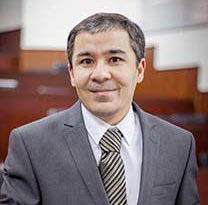
Eric Freedman
A new article by Knight Center director Eric Freedman and Professor Bahtiyar Kurambayev of KIMEP University in Kazakhstan explores how predatory journals use deceptive and unethical tactics to recruit scholars as ostensible editorial board members and manuscript reviewers. Two such journals listed scholars without their consent or knowledge. Others asked unsuccessfully to be removed from the journals’ posted list of board members and reviewers.
Predatory journals mislead authors with promises of meaningful peer review and editorial control when, in reality, the publishers charge high “article processing fees” and articles appear with little or no editing.

Prof. Bahtiyar Kurambayev
Freedman and Kurambayev used a survey and interviews to examine the practices of Insight-News Media and Journalism and Mass Communication – whose title is deceptively similar to Journalism & Mass Communication Quarterly, the flagship publication of the Association for Education in Journalism & Mass Communication.
The findings have practical implications for research in journalism and mass communication, especially for academics in developing country with insufficient English-language proficiency and who face publish-or-perish pressures.
The study is the first of its kind to focus on predatory journals in journalism and mass communication and appears in the latest issue of the Journal of Scholarly Publishing.
